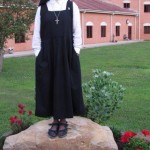The contrast could not be more stark.
Some will argue that prior to the formation of the Catholic church, Roman women had been liberated from enslaving fetters of the old legal forms, and they enjoyed the freedom of intercourse in society, dining in the company of men, studying literature and philosophy, defending their own legal cases. If they wished, they were able to help their husbands in the governance of provinces and the writing of books.
To that I respond…so…you’re saying that the successful and idealized women of today sound like the women of pre-Christian Rome…
Hmmm… Did ALL of the women of pre-Christian Rome enjoy this “equality”, or just the elite women? There is no doubt that anyone who is interested in doing so could cite sources laying out and enumerating all the ways in which women outside of the protected class (a class similar to that class inhabited by the Hillarys and Maureens of this world) were discounted, abused and disrespected – how many were kept in abject servitude and given no opportunity to become educated or to even ponder their God-given potential, much less pursue it?
I’m not interested in reading those books and finding those citations, but you and I both know they exist. Go to Rome and look around; you will find evidence of something like equality, and something like misogyny. Which leads me to ask the big So What: If evidence of “equality” can be so easily matched by evidence of something less than equality, then I say pheh – we need more evidence!
If any of the great statues that grace Rome, or the buildings or the paintings were by female artists or architects, we certainly don’t know that. If any great philosophers of that age were women, we don’t know that, because only the voices of their male counterparts have survived. And I don’t recall ever reading about female Roman senator, either, and so I give a big shrug to the citations of pre-Christian “equality,” because in the end, they mean very little. Show me something solid, show me something I can point to today, and say, “a woman, designed it, a woman composed it, a woman painted it, a woman declared it, a woman argued it, a woman built it, a woman conceived it…” the fact is -utside of the things designed, composed, argued, built and conceived by the women of the church – there are very few examples, and none which roll off the tongue. Can you think of any?
Is that because women were incapable or uneducated? No. Very likely it’s because the ancient women were not quite as “equally regarded” as the men of their time. Had they been, their names would be as easy to bring to our lips as Socrates, Plato, Alexander the Great, Marcus Aurelius, Archimedes and the rest.
Actually, we know of very few women of the ancient times…Cleopatra? :-)
But those we do know of, we know because of their faith, their conversions, their own preaching, and their theological insights. I’m thinking of Mary of Egypt, St. Paula who basically FUNDED and kept St. Jerome in bread and meat while he did his curmudgeonly translations. I’m thinking of St. Thecla who nearly outpreached St. Paul, St. Felicity (a nursing mother) who, before being fed to the lions with St. Perpetua left the first recorded diary written by a woman, one which detailed her trial (at which she defended herself, arguing for the Christians).
I’m thinking of all the virgin martyrs Agnes, Agatha, Lucy, Philomena and so many others, who have been so badly remembered by the Italians in the church. They emphasized their hymens when the real premium, the REAL reason to laud their virginal state was because their decisions to consecrate themselves to the Lord meant taking a stand – a dangerous stand – against the idea of being chattel which could be married off to increase a holding, assure an alliance or even pay off a debt. Their virginity was not evidence of a gooey sentiment but of their own strength, courage and even, dare I say it, self-actualization; the Holy Grail of modern feminism. These Christian women were the ones to say, “tough nuggies, baby, I’m NOT doing this married-off as-chattel thing; I’m going to do something else with my life, and it’s my choice!”
St. Barbara, St. Dymphna…I could go on and on.
The myth of the free and equal woman…well, I don’t know if women will ever be completely free or “equal.” It seems to me that women can never be free as long as they believe that their freedom lies in the negation of their femininity and the embrasure of all that is masculine. I don’t see any freedom in putting on the male, or believing that what is traditionally “male” is therefore empowering and desirable. I don’t see freedom in the teeth-grinding frustration that exists in women who believe that they cannot be fu
lly women unless they be “exactly” like men (who aren’t all that free, either.)
I don’t see freedom in believing that one’s gender is a mere accident of birth rather than a gift to be explored and embraced and fulfilled. The Creator God does not accidentally Create us. He loves us into being, and “I know the plans I have for you, says the Lord, plans of fullness, not of harm, to give you a future and a hope…” (Jeremiah 29:11)
The shrinking violet from MIT, who nearly lost it because Lawrence Summers suggested men and women might be different in nature – she didn’t seem particularly FREE to me. Indeed, such women seem completely bound and caged in by their ideologies and their feminist sensibilities. They’re not free, because they can only behave a certain way, or they don’t belong to the club.
Is “equality with men” the pinnacle of feminine empowerment? That’s a completely subjective question. I know that is a politically incorrect thing to say, and that we’re taught that there is nothing SUBJECTIVE about it. But it really is subjective. And maybe it’s time to look at the feminists “truths” of the last 50 years, and look at them subjectively.
Interestingly, after 2000 years society has nearly become what it was. We are entering into a vast, post-Christian era, but I’m looking around at the world, and gosh, the post-Christian era doesn’t look all that swell and enlightened to me. In fact, it looks intolerant, socialistic, intellectually dishonest, prejudiced and weighted toward the elite, protected class over the common people.
Some might snark that, if that’s the case, then the post-Christian era is not a whole lot different than the Christian era. We’ll see.
In the meantime, it’s worth remembering that it was the Catholic church, before anything else, which looked at the women who surrounded the most Important Being delivered upon the earth and saw them as women-in-full, worthy of honor and exclamation and respect. While Sarah and Rebecca and Esther and Ruth had their roles, and were honored, that respect – that willingness to look at women as more than footnotes but as essential members of the whole great pageant of Salvation, that began with Mary.
UPDATE: Some nice writing and reasoning from the Paragraph Farmer.











